Yelp Business Model Canvas 2024
While countless businesses dot the urban landscape, vying for attention and patronage, Yelp emerges as the discerning diner’s digital compass, guiding culinary adventurers through a labyrinth of eateries with user-generated reviews that illuminate the path to gastronomic bliss. In this Yelp business model canvas, I will identify its customer segments, value proposition, revenue streams, channels, customer relationships, key activities, key resources, key partners, and cost structure.
Interesting fact!
Yelp created a patented “Wordmap” feature that shows heat maps of popular words in reviews.
Yelp Competitors
Google Maps | TripAdvisor | OpenTable | Foursquare | Zomato | Zagat | Facebook | Angi (formerly Angie’s List) | Better Business Bureau | Trustpilot
Customer Segments – Yelp Business Model Canvas
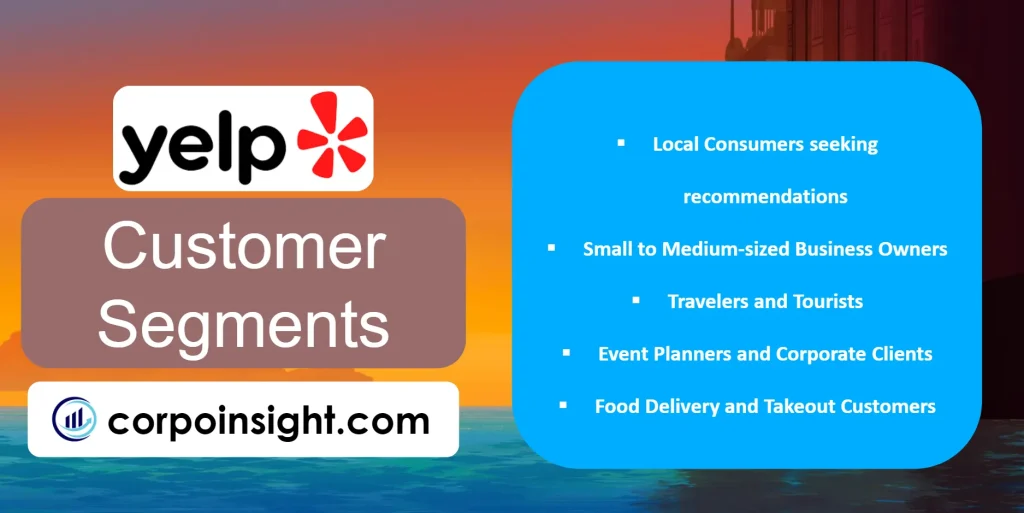
Local Consumers seeking recommendations: These individuals, ranging from millennials to Gen Z, who are increasingly reliant on digital platforms, utilize Yelp to discover and evaluate local businesses, restaurants, and services; they often consult reviews before making purchasing decisions, particularly when exploring new areas or seeking specific experiences.
Small to Medium-sized Business Owners: This segment comprises local entrepreneurs and proprietors who leverage Yelp’s platform to increase their visibility, manage their online reputation, and engage with customers; they often use Yelp’s business tools to respond to reviews, post updates, and analyze customer feedback to improve their services.
Travelers and Tourists: Both domestic and international visitors frequently turn to Yelp when exploring unfamiliar locations, seeking authentic local experiences, and making informed choices about accommodations, dining, and activities; this segment’s usage tends to spike during peak travel seasons and in popular tourist destinations.
Event Planners and Corporate Clients: Professional organizers and businesses often consult Yelp when arranging corporate events, team-building activities, or client meetings; they rely on the platform’s extensive database and user reviews to find suitable venues, catering services, and entertainment options that align with their specific requirements and budget constraints.
Food Delivery and Takeout Customers: In the wake of the global pandemic and the subsequent shift in consumer behavior, there has been a significant increase in users leveraging Yelp to find and order from restaurants offering delivery and takeout services; this segment often utilizes Yelp’s integration with third-party delivery platforms for a seamless ordering experience.
Value Proposition – Yelp Business Model Canvas
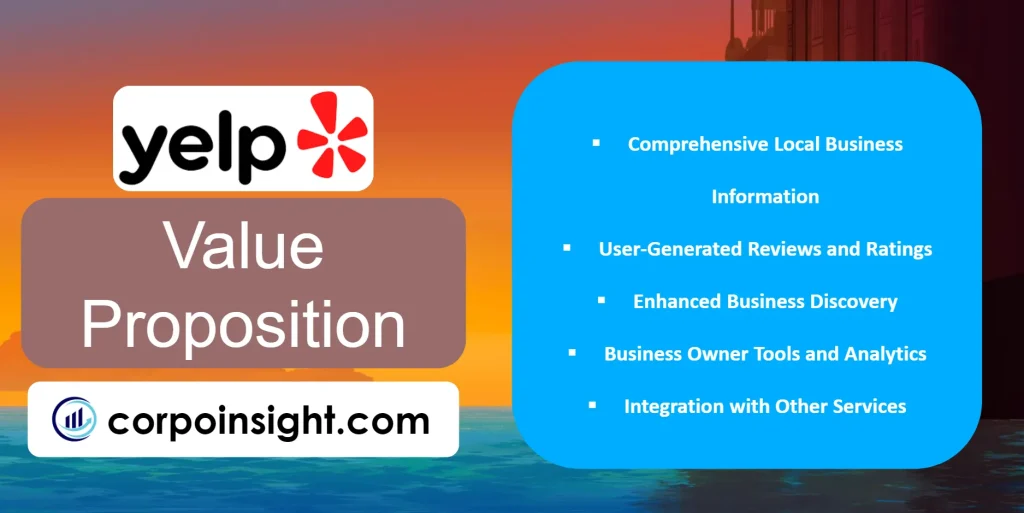
Comprehensive Local Business Information: Yelp offers users an extensive database of local businesses, complete with detailed information such as operating hours, contact details, and menu items; this wealth of data, coupled with user-generated content, provides consumers with a one-stop platform for informed decision-making about local services and establishments.
User-Generated Reviews and Ratings: The platform’s core value lies in its vast collection of authentic user reviews and ratings, which offer prospective customers real-world insights into businesses’ quality and service; this crowdsourced information helps users make confident choices while simultaneously incentivizing businesses to maintain high standards.
Enhanced Business Discovery: Yelp’s advanced search algorithms and filters enable users to discover new businesses tailored to their specific preferences and needs; this feature not only benefits consumers seeking unique experiences but also provides increased visibility for lesser-known local establishments that might otherwise struggle to attract attention.
Business Owner Tools and Analytics: For business owners, Yelp offers a suite of tools to manage their online presence, respond to reviews, and analyze customer feedback; these features, including performance metrics and advertising options, empower businesses to improve their services and effectively market to their target audience.
Integration with Other Services: Yelp’s partnerships and integrations with various platforms, such as Apple Maps, Uber, and food delivery services, enhance its value proposition by offering users a seamless experience; these integrations allow consumers to move effortlessly from discovery to action, whether that’s getting directions, booking a ride, or placing an order.
Revenue Streams – Yelp Business Model Canvas
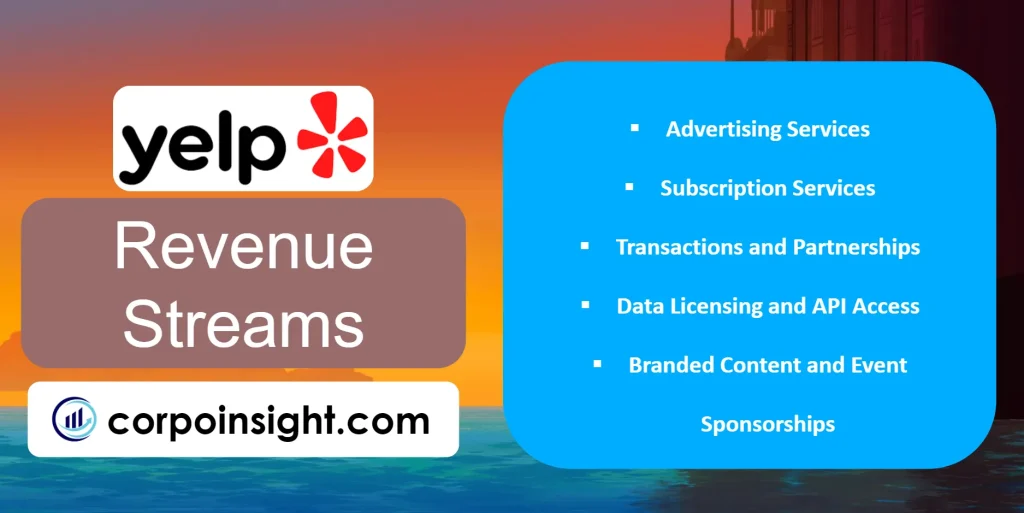
Advertising Services: Yelp’s primary revenue source stems from its advertising platform, where businesses can purchase targeted ads to increase their visibility; these ads, which appear in search results and competitor pages, operate on a cost-per-click model and are particularly popular among small to medium-sized local businesses seeking to attract nearby customers.
Subscription Services: The company offers premium tools and features to businesses through subscription-based programs like Yelp Connect and Yelp Reservations; these services, which include enhanced profile customization, customer engagement tools, and reservation management systems, provide a steady stream of recurring revenue while offering added value to business clients.
Transactions and Partnerships: Yelp generates revenue through partnerships with third-party services, such as food delivery platforms and booking services; by facilitating transactions directly through its platform and taking a commission on each sale, Yelp has diversified its income streams beyond traditional advertising.
Data Licensing and API Access: Leveraging its vast database of business information and user-generated content, Yelp monetizes its data by licensing it to third-party developers and companies; this revenue stream includes API access fees for businesses integrating Yelp’s content into their own applications or services.
Branded Content and Event Sponsorships: Yelp capitalizes on its strong brand and user base by offering sponsored content opportunities and hosting events; these initiatives, which include branded lists, sponsored collections, and local “Yelp Elite” events, provide additional revenue while enhancing user engagement and fostering community connections.
Channels – Yelp Business Model Canvas
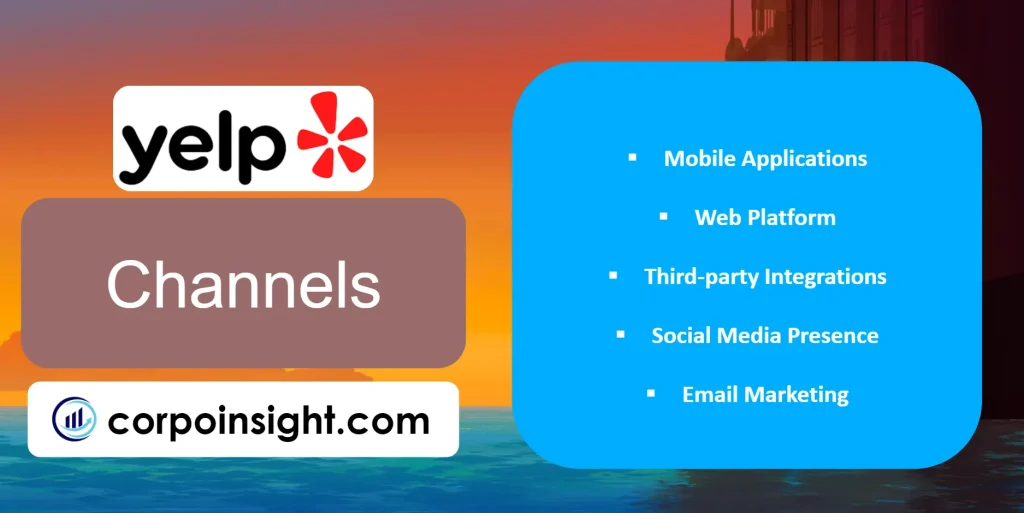
Mobile Applications: Yelp’s mobile apps, available on iOS and Android platforms, serve as a primary channel for user engagement; these apps, which leverage location-based services and push notifications, provide a seamless experience for users seeking real-time information about nearby businesses, thereby driving significant traffic and user interactions.
Web Platform: The company’s website remains a crucial channel, offering a comprehensive interface for both consumers and businesses; this platform, which is optimized for desktop and mobile browsers, allows for in-depth research, detailed review writing, and access to advanced features that complement the mobile app experience.
Third-party Integrations: Yelp extends its reach through strategic partnerships and integrations with other popular platforms; these collaborations, such as the integration with Apple Maps, car navigation systems, and virtual assistants like Siri and Alexa, expose Yelp’s content to a broader audience and drive user engagement through diverse touchpoints.
Social Media Presence: Leveraging popular social media platforms, Yelp maintains active profiles on Facebook, Twitter, and Instagram; these channels not only serve as marketing tools but also as customer support and community engagement platforms, where the company shares curated content, responds to user inquiries, and promotes local businesses.
Email Marketing: Despite the shift towards mobile-first strategies, Yelp continues to utilize email as an effective channel for user retention and engagement; through personalized newsletters, review reminders, and local event promotions, the company maintains regular communication with its user base, encouraging ongoing platform interaction and discovery of new features.
Customer Relationships – Yelp Business Model Canvas
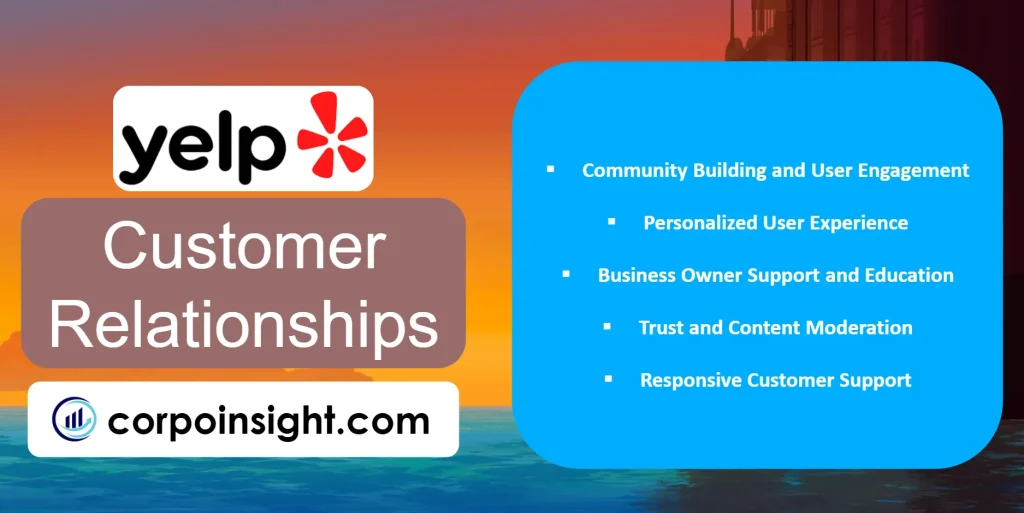
Community Building and User Engagement: Yelp fosters a sense of community through its “Elite” program and local events; this initiative, which recognizes and rewards active contributors, not only encourages high-quality content generation but also cultivates a loyal user base that feels valued and connected to the platform.
Personalized User Experience: Leveraging advanced algorithms and machine learning, Yelp tailors content to individual user preferences; this personalization, which encompasses everything from search results to recommended businesses, enhances user satisfaction by providing relevant, location-specific information that aligns with each user’s unique interests and past behavior.
Business Owner Support and Education: Recognizing the symbiotic relationship between businesses and reviewers, Yelp maintains dedicated support channels for business owners; through webinars, tutorials, and personalized advice, the company empowers businesses to effectively manage their online presence, thereby improving the overall quality of the platform for all users.
Trust and Content Moderation: To maintain the integrity of its platform, Yelp employs a sophisticated content moderation system that combines AI algorithms with human oversight; this approach, which aims to filter out fake or biased reviews, builds trust among users and businesses alike, ensuring that the platform remains a reliable source of information.
Responsive Customer Support: Yelp maintains multiple channels for customer support, including in-app messaging, email, and social media; by offering prompt and effective resolution to user inquiries and concerns, the company demonstrates its commitment to user satisfaction, which in turn fosters long-term loyalty and positive word-of-mouth recommendations.
Key Activities – Yelp Business Model Canvas
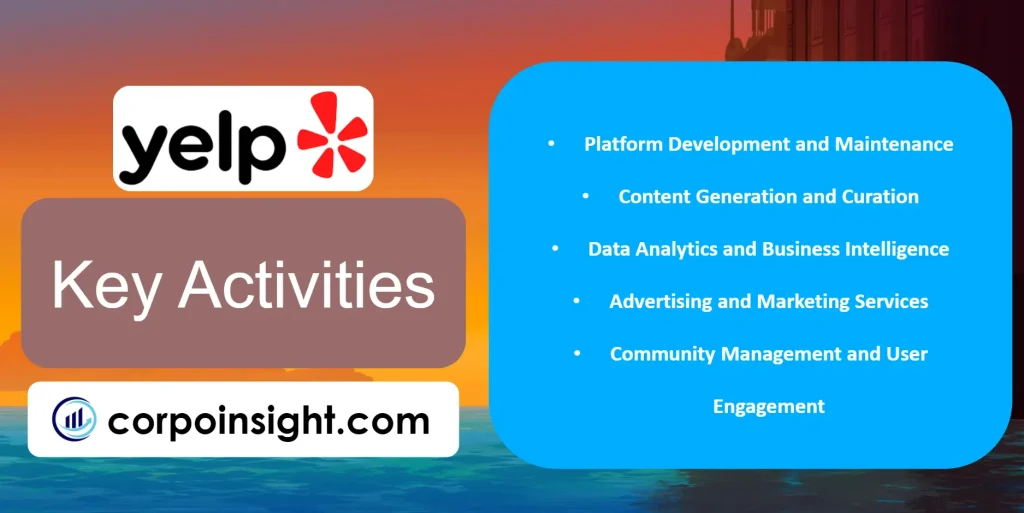
Platform Development and Maintenance: Yelp continuously enhances its web and mobile platforms, focusing on user experience and functionality; this ongoing development, which includes regular updates to search algorithms and the introduction of new features like augmented reality integration, ensures that the platform remains competitive and relevant in the rapidly evolving digital landscape.
Content Generation and Curation: While user-generated content forms the core of Yelp’s offering, the company actively engages in content curation and creation; through initiatives such as city guides, trending lists, and expert recommendations, Yelp supplements user reviews with curated content that adds value for both casual browsers and intent-driven searchers.
Data Analytics and Business Intelligence: Leveraging its vast repository of user data and business information, Yelp conducts extensive analytics to derive actionable insights; these activities, which inform everything from personalized recommendations to market trend reports, not only enhance the user experience but also provide valuable intelligence to partnering businesses and advertisers.
Advertising and Marketing Services: A significant portion of Yelp’s activities revolves around its advertising platform, where the company develops and optimizes ad products for local businesses; this includes creating targeted advertising solutions, managing campaigns, and providing performance metrics that enable businesses to maximize their return on investment.
Community Management and User Engagement: Yelp invests considerable resources in fostering and managing its user community; through activities such as organizing local events, managing the Elite program, and moderating user-generated content, the company works to maintain a vibrant and trustworthy ecosystem that keeps users engaged and attracts new contributors to the platform.
Key Resources – Yelp Business Model Canvas
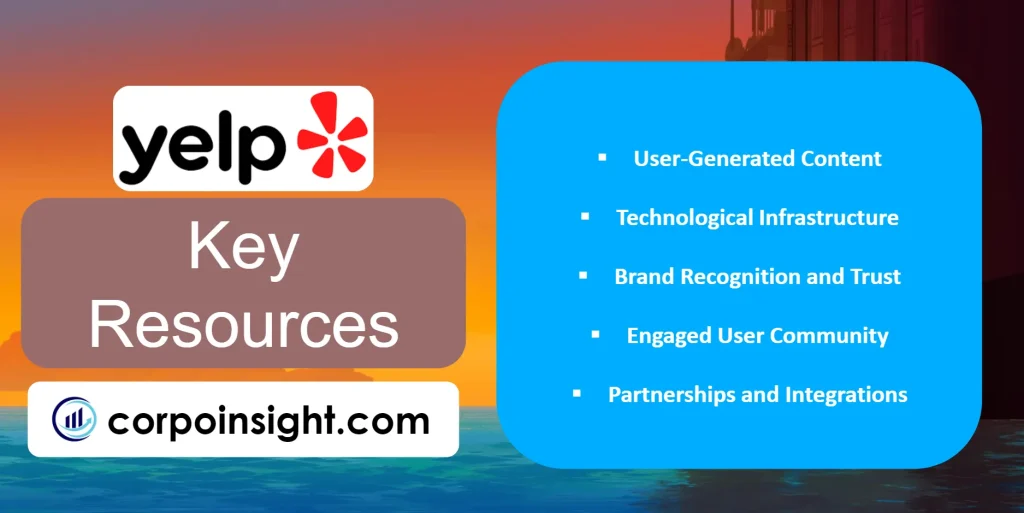
User-Generated Content: Yelp’s most valuable asset is its vast repository of user-generated reviews, photos, and ratings; this extensive database, which grows daily and covers millions of businesses across various categories, forms the foundation of Yelp’s value proposition and serves as a critical resource for both consumers and businesses seeking local insights.
Technological Infrastructure: The company’s robust technological backbone, encompassing advanced servers, data centers, and proprietary algorithms, enables Yelp to manage its enormous data load efficiently; this infrastructure, which is continually upgraded to accommodate growing user demands and emerging technologies, is crucial for maintaining the platform’s speed, reliability, and scalability.
Brand Recognition and Trust: Yelp’s strong brand equity, built over years of consistent service and market presence, serves as a key intangible resource; this brand recognition, which positions Yelp as a go-to platform for local business information, not only attracts new users but also enhances the company’s negotiating power with potential partners and advertisers.
Engaged User Community: The platform’s active and diverse user base, including the highly valued “Elite” contributors, represents a critical human resource; these engaged users not only generate the content that powers the platform but also act as brand ambassadors, driving organic growth through word-of-mouth recommendations and social sharing.
Partnerships and Integrations: Yelp’s strategic partnerships with major tech companies, payment processors, and service providers constitute a valuable relational resource; these collaborations, which include integrations with Apple Maps, Uber, and various restaurant reservation systems, extend Yelp’s reach and functionality, creating a more comprehensive and seamless user experience.
Key Partners – Yelp Business Model Canvas
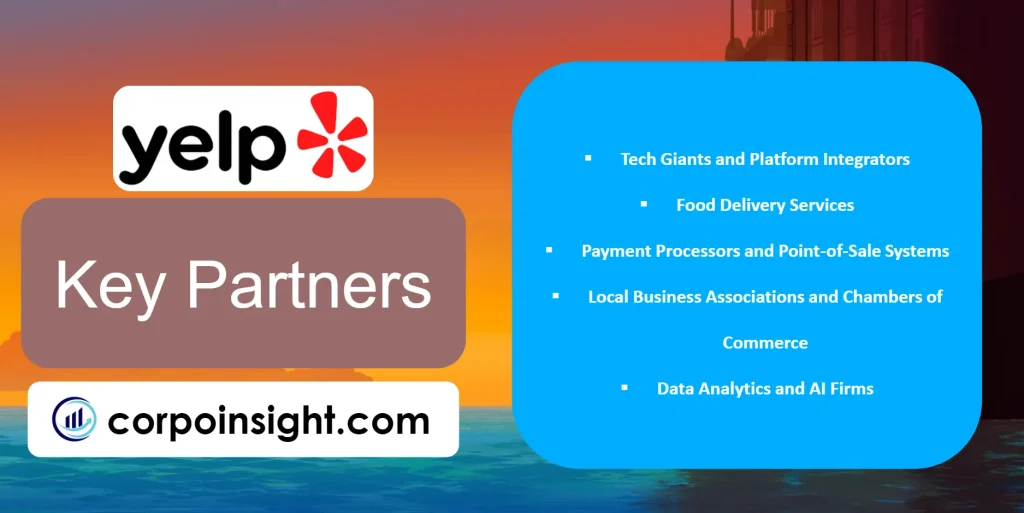
Tech Giants and Platform Integrators: Yelp’s partnerships with major technology companies, such as Apple and Amazon, play a crucial role in expanding its reach; these collaborations, which include integration with Apple Maps and compatibility with voice assistants like Alexa, not only increase Yelp’s visibility but also enhance its functionality across various devices and platforms.
Food Delivery Services: In response to changing consumer habits, Yelp has forged strategic alliances with popular food delivery platforms; these partnerships, which seamlessly integrate ordering capabilities into Yelp’s restaurant listings, not only provide added convenience for users but also generate additional revenue streams through commission-based transactions.
Payment Processors and Point-of-Sale Systems: Yelp’s collaborations with payment processing companies and POS system providers facilitate smoother transactions and data integration for businesses; these partnerships enable features like online reservations, waitlist management, and direct payments through the Yelp platform, enhancing the overall user experience and strengthening Yelp’s value proposition for business owners.
Local Business Associations and Chambers of Commerce: By partnering with local business organizations, Yelp gains valuable insights into regional markets and establishes credibility within business communities; these relationships, which often involve co-sponsored events and educational initiatives, help Yelp to better serve small businesses and adapt its offerings to meet local needs.
Data Analytics and AI Firms: Yelp’s partnerships with data analytics companies and artificial intelligence specialists contribute to its continuous improvement in areas such as personalized recommendations and fraud detection; these collaborations enable Yelp to leverage cutting-edge technologies, ensuring that its platform remains innovative and responsive to evolving user expectations and market trends.
Cost Structure – Yelp Business Model Canvas
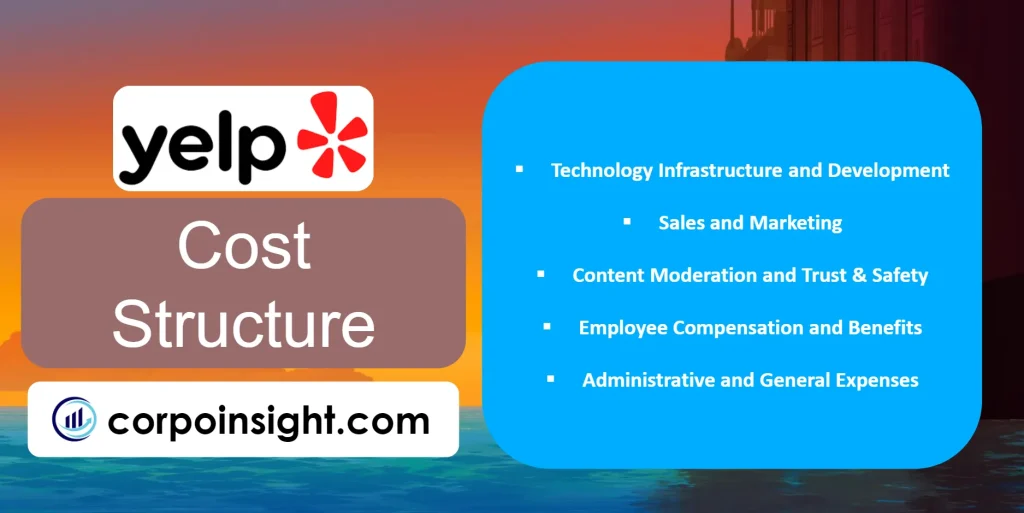
Technology Infrastructure and Development: A significant portion of Yelp’s expenses is allocated to maintaining and upgrading its technological infrastructure; this includes costs associated with data centers, cloud services, and the continuous development of its web and mobile platforms, which are essential for ensuring optimal performance and introducing new features to stay competitive in the dynamic digital landscape.
Sales and Marketing: Yelp invests heavily in its sales force and marketing initiatives to attract both users and advertising clients; these expenses, which encompass everything from digital advertising campaigns to the salaries of its sales team, are crucial for driving user growth and generating revenue from local businesses, thereby fueling the company’s expansion and market presence.
Content Moderation and Trust & Safety: To maintain the integrity of its platform, Yelp allocates substantial resources to content moderation and trust & safety measures; this cost category includes both AI-powered tools and human moderators who work tirelessly to combat fake reviews, spam, and inappropriate content, ensuring that Yelp remains a trusted source of information for consumers and businesses alike.
Employee Compensation and Benefits: As a technology company, Yelp’s workforce is one of its most valuable assets, and consequently, a major cost center; the expenses in this category cover not only salaries for its diverse team of engineers, data scientists, and business professionals but also comprehensive benefits packages and stock-based compensation, which are essential for attracting and retaining top talent in the competitive tech industry.
Administrative and General Expenses: Yelp incurs various operational costs that support its overall business functions; these expenses include office leases, legal fees, insurance, and professional services, all of which are necessary for maintaining the company’s day-to-day operations and ensuring compliance with regulatory requirements across the numerous markets in which Yelp operates.
Summary of Yelp Business Model Canvas
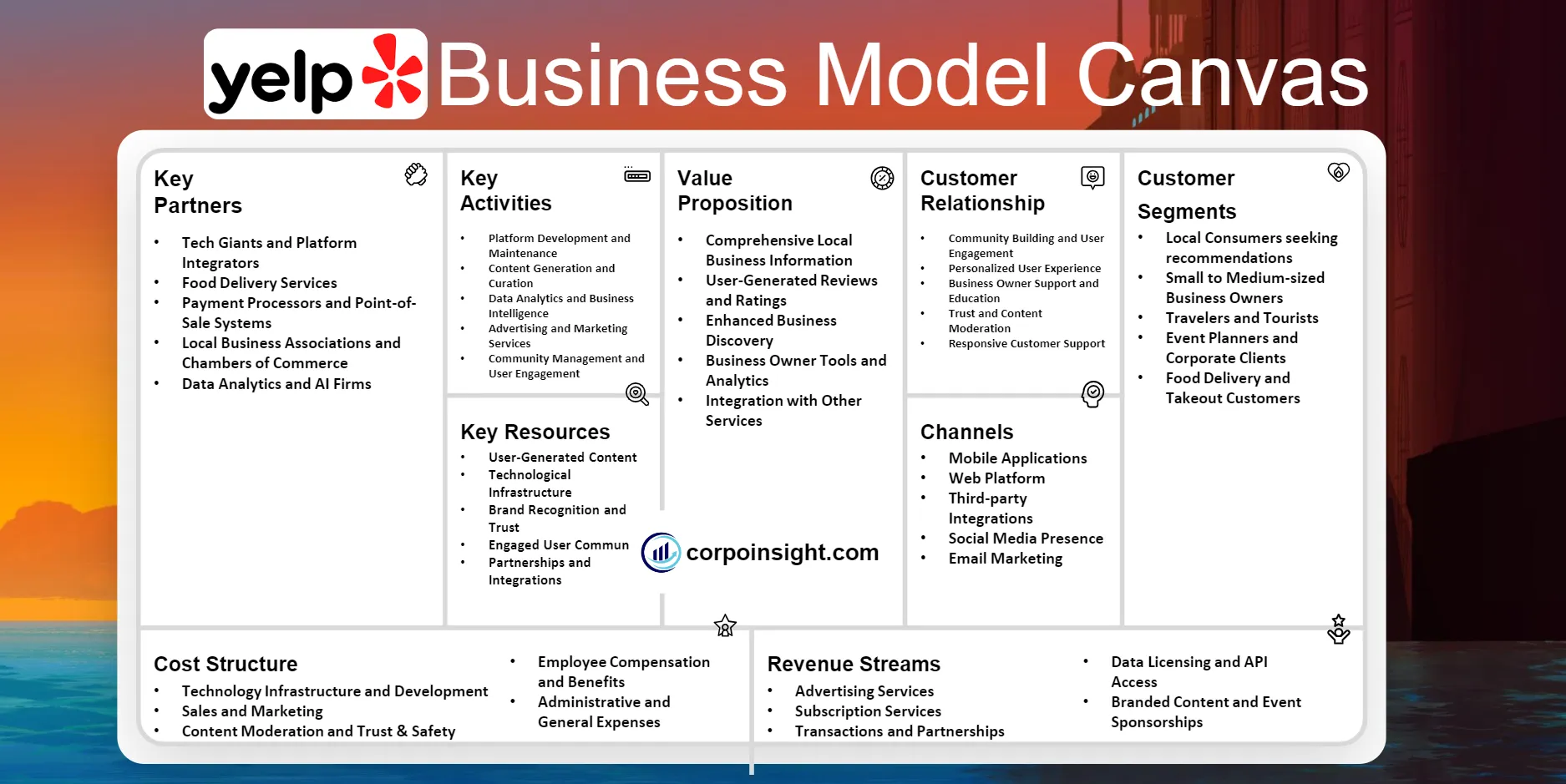
Conclusion on Yelp Business Model Canvas
Yelp’s Business Model Canvas reveals a robust platform that leverages user-generated content to connect consumers with local businesses. Its value proposition centers on providing comprehensive, trustworthy information through a user-friendly interface. Yelp’s revenue streams primarily come from advertising and subscription services, supported by key partnerships and a strong technological infrastructure. The company’s focus on community engagement, content quality, and continuous innovation positions it as a leader in the local business discovery and review space, despite facing increasing competition and evolving consumer behaviors.

This is Ahsanul Haque, someone very passionate about digital marketing, SEO, and Data Analytics and founder of the Analytics Empire and currently pursuing my major in marketing at Bangladesh University of Professionals.






